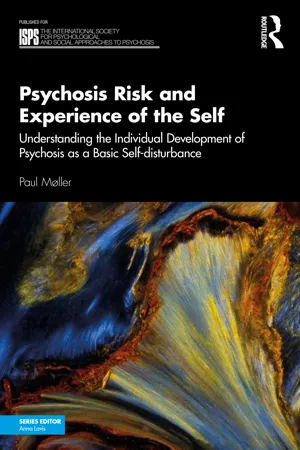
Psychosis Risk and Experience of the Self
Understanding the Individual Development of Psychosis as a Basic Self-disturbance
- 206 pages
- English
- ePUB (mobile friendly)
- Available on iOS & Android
Psychosis Risk and Experience of the Self
Understanding the Individual Development of Psychosis as a Basic Self-disturbance
About this book
Møller sheds light on the inner aspects of psychosis and psychosis risk, and its core experiential phenomena as a method of understanding the individual early psychosis development.
The book details how such experiences might take shape in the human mind and how a better understanding achieved through detailed clinical conversations can lead to earlier detection and improved interventions. Møller also outlines the subjectivity model (also called Ipseity Disturbance Model) and presents a broad review of different treatment approaches and settings, in which work with disturbed self-experience could be integrated, including psychotherapy, in-patient milieu therapy, supportive treatments, psychoeducational family work, local networking, and medication.
Psychosis Risk and Experience of the Self will prove essential for experienced and specialised clinicians as well as the more generally interested reader.
Frequently asked questions
- Essential is ideal for learners and professionals who enjoy exploring a wide range of subjects. Access the Essential Library with 800,000+ trusted titles and best-sellers across business, personal growth, and the humanities. Includes unlimited reading time and Standard Read Aloud voice.
- Complete: Perfect for advanced learners and researchers needing full, unrestricted access. Unlock 1.4M+ books across hundreds of subjects, including academic and specialized titles. The Complete Plan also includes advanced features like Premium Read Aloud and Research Assistant.
Please note we cannot support devices running on iOS 13 and Android 7 or earlier. Learn more about using the app.
Information
Table of contents
- Cover
- Endorsements
- Half Title
- Series
- Title
- Copyright
- Dedication
- Contents
- Preface
- Acknowledgements
- A central conversation
- Use of the term ‘schizophrenia’ in this book
- 1 An initial aerial view of the field, then heading for the inside
- 2 To understand is a universal human need
- 3 The prodromal phenomena illuminate the core of existence – aiding the understanding of psychosis
- 4 The problem of defining the prodromal phase
- 5 The view of science determines the view of psychosis
- 6 Subjectivity
- 7 The self and basic self-disturbance
- 8 Diagnostics, phenomenology, and the EASE manual in the field of psychosis risk
- 9 The five domains of the EASE manual
- 10 The view of psychosis treatment among professionals and health authorities is changing
- 11 What about other models of understanding and therapeutic approaches to psychosis? Do they use subjectivity, self-experience, or self-understanding as explicit concepts?
- 12 Self-disturbances as part of a wider treatment context
- 13 Conversation and phenomenology
- 14 Therapeutic effects and obstacles
- 15 Approaches and settings in treatment directed at basic self-disturbances
- 16 Outline of a pragmatic seven-step treatment module
- 17 Implementing the Subjectivity Model
- Appendix
- Index